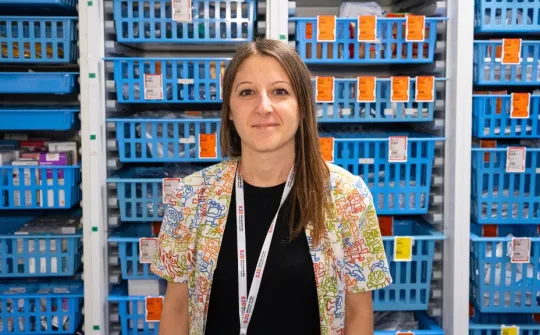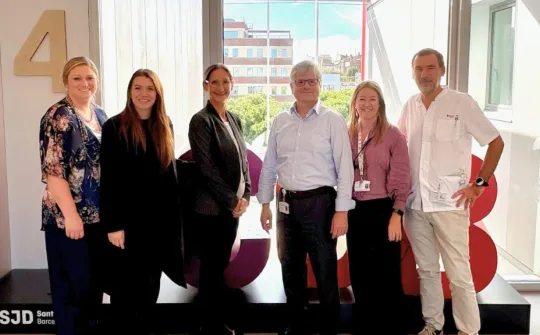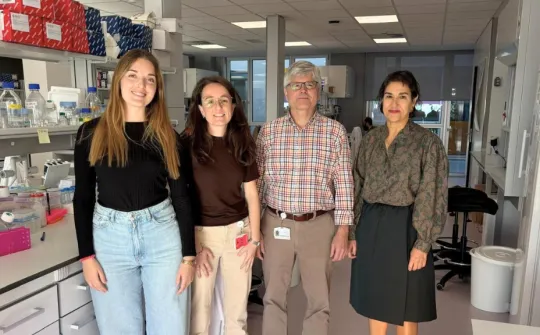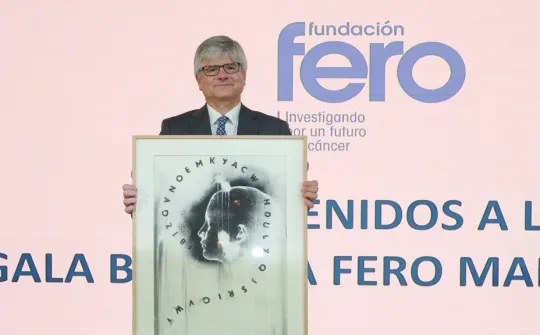‘Nurses have to be curious and driven to investigate, question protocols alongside patients and base our actions on scientific evidence’

Montserrat Gutiérrez is the Nursing Research Coordinator at SJD Barcelona Children’s Hospital. We discuss the importance of research in nursing care and she tells us about her experience in designing a research project that staff at the Hospital are hoping to conduct.
How would you describe the importance of research in nursing and its impact on the quality of care patients and their families receive?
Research in nursing has a direct impact on quality of care, as it allows us to assess how effective our actions are and develop new practices based on scientific evidence that improve results in patient care. It is vital that we distance ourselves as much as possible from phrases like ‘we have always done it this way’ or ‘I learned it this way’. We have to be able to justify our actions with evidence and, if needed, adapt them accordingly. Plus, research helps us to improve care coordination between different healthcare teams and reduce mistakes. Our main goal is always to improve the health and wellbeing of our patients and their families.
In recent years, there has been particular emphasis placed on involving patients and their families in research processes. How do you do that?
Engaging patients and families with research is crucial and they are involved from the start of of a scientific study. During the design phase when we formulate our research question, we present our ideas directly to the patients using various measures to get feedback from them. This active participation is backed by scientific rigour and has prior approval from an Ethics Committee, be it during a study to improve internal processes or a study on a particular situation, where experiences and opinions are formed during daily nursing care provision. Observation and listening to patients and families yields the information needed to inspire this curiosity, to then put it into words as a research question.
It is a feedback loop that allows us to focus our research on objectives that are more aligned with our patients’ needs. Essentially, when a nurse follows procedure or a protocol, it is vital that the perspective of patients and their families is also taken into account. This allows us to understand the impact of our actions and, if needed, modify them based on the scientific evidence at hand.
‘Research helps us to improve care coordination between different healthcare teams and reduce mistakes’
What difficulties do you have when it comes to finding families to participate in the studies?
The first hurdle is their attitude towards science and the social situation of each family. Although involvement in healthcare issues has grown in recent years, especially when it comes to advanced directives, for example, there is still some degree of safeguarding in the field of paediatrics. When we conduct a study with a paediatric cohort, not only do we need consent from the patient's family, but if the child is over 12 years old we need their consent, too. Researchers must understand that despite having consent for the family, the law protects the children. We are obligated to listen to them and ensure that they are properly informed of the details of the study so they can voluntarily choose to participate in it.
Many of your interventions involve children and families in desperate situations, such as being admitted to the PICU or cases of paediatric cancer. How do you ask them if they want to be involved in research?
SJD Barcelona Children's Hospital is lucky to have multidisciplinary teams treating our patients, made up of doctors, social workers, nurses and nurse auxiliaries, as well as psychologists. We approach the patients and their families through these teams. All healthcare professionals, introduce the study situation from their respective area of expertise and collect the necessary information. This allows us to approach the patients respectfully and empathetically, taking into account the difficult situation they and their families are going through. There are several internal programs at the Hospital that facilitate family and patient participation in research projects in a gentle, non-invasive way. Furthermore, it is important that they are always aware that they are taking part in a study, and of what is expected of them and how they can help us. On our side, we have to guarantee the utmost respect for all participants and ensure impeccable scientific quality.
Interest in nursing research has gained traction in the last few years, which is shown by the creation of everyone's job role. What characteristics does a nurse require to conduct research?
It is hugely important, if not essential, to be a curious person with a lot of questions. You have to be able to reflect and evaluate whether the program or procedure at hand is the best option for the patient and their family, and whether it suits their needs.
Let me give you an example: when we train family members on how to perform certain procedures at home, we have to consider what their home situation is actually like, and adapt how we teach them to the materials and resources they have available. But that is not all. Once they are at home, we have to be able to follow them up, see if what we told them to do is working or not, if they have run into any issues, if they have had to return to the Hospital and, if so, why. This follow-up allows us to understand the situations our patients must go through and not limit our clinical response to mechanically checking off a list of interventions the patient needs. Modifying and improving procedures to suit real-life situations ensures our work is built on a foundation of solid evidence and good practice.
For a nurse who wants to conduct research, when they go into a patient's room, they have to be able to ask themselves questions and assess all possible options—like what resources are available or how the team can work together. They also need to be up to date with other fields, be aware of recent discoveries and progress in their area of interest, to read up about it and to be inquisitive. This can be attained by nurturing an investigative spirit.
Once a nurse has this spirit and has an idea for a research project, what would be the next step?
With the creation of the Research Support Nurse role at the Hospital, the next steps can be quite easy. I would say that the first step is to get over any fear or embarrassment of developing an idea and asking questions. An environment of trust, values and active listening is vitally important. I then offer any support that is needed, from training in research methodology to designing the study protocol (method, necessary details, consent, instruments and tools to analyse results, etc.). My goal in this research mentorship is to be a present figure, making sure nurses can learn the skills they need to successfully conduct research projects. In this way, they will be able to become agents of change and improve nursing care.
We must never forget that nurses are caregivers, managers, teachers and researchers. As a group, we have to make sure we continue to develop and cultivate these four roles.
‘The main challenge is to create a favourable environment within the Hospital that allows for research groups in nursing care to emerge’.
What do the data on nursing research at SJD tell us right now?
Well, research activity at the Hospital is increasing year on year. We ended 2024 on a high note: our advanced practice nurse (APN) Carmen Yoldi successfully defended her PhD; the PERIS 2024-2026 project by the Palliative Care and Chronic Complex Patient Department's very own Lucía Peñarrubia; 14 research projects approved by the CEIm; a further three doctorands, bring the total to 13; three publications in an industry journal; the Time Bank (time for research); more than 14 professionals involved in various projects; one final residency project (TFR - residents specialising in paediatric nursing) approved by the CEIm and already collecting data.
Our participation in national and international conferences and workshops has also increased, showing the keen interest in continuing professional development at the Hospital and the desire to network and collaborate with other professionals across the country and abroad.
What are the challenges that nurses at SJD Barcelona Children's Hospital are facing at the moment?
The main challenge is to create a favourable environment within the Hospital that allows for research groups in nursing care to emerge, and to promote the spread of knowledge that benefits not only the academic community, but also our patients and their families. With this focus, we hope to remain at the vanguard of healthcare by offering our patients the highest quality care and ensuring that our research findings translate into tangible benefits for patients and the scientific community.
What challenges do you expect to face in your new role as Research Coordinator?
In 2024, I rolled out the tools to promote research among Nursing Management staff and to help detect nurses with research potential. Now, in 2025, the aim is to confirm these profiles and get some research groups going. We have some indicators to follow and to guide our assessments, so those must be the springboard for the next steps: science, commitment and impact.




